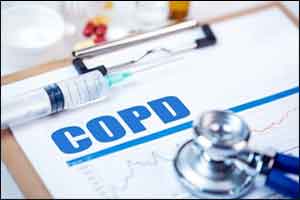- Home
- Editorial
- News
- Practice Guidelines
- Anesthesiology Guidelines
- Cancer Guidelines
- Cardiac Sciences Guidelines
- Critical Care Guidelines
- Dentistry Guidelines
- Dermatology Guidelines
- Diabetes and Endo Guidelines
- Diagnostics Guidelines
- ENT Guidelines
- Featured Practice Guidelines
- Gastroenterology Guidelines
- Geriatrics Guidelines
- Medicine Guidelines
- Nephrology Guidelines
- Neurosciences Guidelines
- Obs and Gynae Guidelines
- Ophthalmology Guidelines
- Orthopaedics Guidelines
- Paediatrics Guidelines
- Psychiatry Guidelines
- Pulmonology Guidelines
- Radiology Guidelines
- Surgery Guidelines
- Urology Guidelines
COPD Treatment: LABA-LAMA combo equally effective as LABA-ICS inhalers

Canada: Combined LABA-LAMA inhalers appear to be equally effective as combined LABA-ICS inhalers in the patients whose chronic obstructive pulmonary disease (COPD) is not controlled with a long-acting bronchodilator alone in a real-world clinical practice setting, according to a recent study published in the journal Chest.
COPD is an inflammatory disease of the small airways in the lungs. The disease accounts for 10.9% of the total deaths in India in 2016 and is the second leading cause of death in the country. It is characterized by periods of exacerbations, an acute worsening of respiratory symptoms beyond normal daily variations which warrant a change in medication.
The combination of a long-acting antimuscarinic (LAMA) agent and a long-acting β-agonist (LABA) is recommended by the Global Initiative for Chronic Obstructive Lung Disease (GOLD) Guidelines in preventing COPD exacerbations. Still, clinicians prefer a combination of LABA-ICS (inhaled corticosteroid) inhalers. Previous studies comparing the effectiveness of LABA-LAMA combination inhalers with LABA-ICS combo Inhalers have yielded conflicting results.
Samy Suissa, Centre for Clinical Epidemiology, Jewish General Hospital, Montreal, QC, Canada, determined which of these two combinations (LAMA-LABA OR LABA-ICS) works best for preventing COPD exacerbation in the real-world clinical practice setting.
For the purpose, the researchers matched 2000 COPD patients 55 years or older using national U.K. clinical data who started LABA/LAMA therapy with similar patients who contemporaneously started LABA/ICS. Patients remained on their initial combinations for a mean duration of ≈3 months. They were then monitored for 1 year for the occurrence of a moderate or severe COPD exacerbation and severe pneumonia.
Also Read: New tool identifies COPD patients at risk of complications, death
Key findings of the study include:
- During 1 year of follow-up, the incidence of first COPD exacerbation requiring systemic corticosteroids or hospitalization was similar in both groups (≈75 exacerbations per 100 patients, respectively).
- Among patients who remained on their initial therapy, the incidence of severe pneumonia requiring hospitalization was lower in the LABA/LAMA group than in the LABA/ICS group (5 vs. 8 per 100 patients).
- Among patients with high peripheral eosinophil levels (i.e., >6%), slightly more exacerbations occurred in the LABA/LAMA group than in the LABA/ICS group.
Also Read: BODE index can predict COPD exacerbations: JAPI

Disclaimer: This site is primarily intended for healthcare professionals. Any content/information on this website does not replace the advice of medical and/or health professionals and should not be construed as medical/diagnostic advice/endorsement or prescription. Use of this site is subject to our terms of use, privacy policy, advertisement policy. © 2020 Minerva Medical Treatment Pvt Ltd